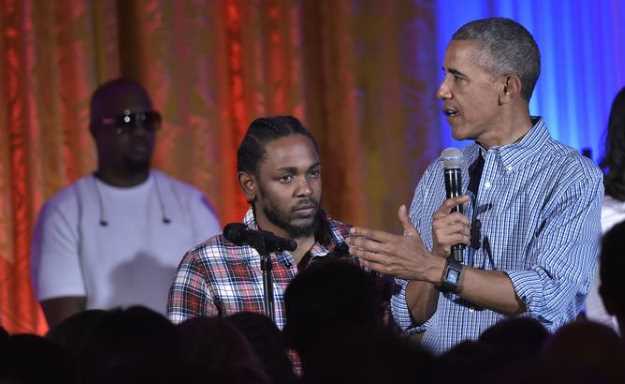| |
Taken from HotNewHipHop (Feb 23, 2018)
How The Relationship Between Hip-Hop & Politics Has Evolved
A brief overview and discussion of hip-hop's interaction with politics, in light of Black History Month.
by Karlton Jahmal

MANDEL NGAN/AFP/Getty Images |
"This world is such a, and when I say this world I mean it, I don’t mean it in an ideal sense, I mean in every day, every little thing you do. It’s such a gimme, gimme, gimme! Everybody back off. You know, everybody’s taught that from school. Everywhere, big business, you want to be successful? You want to be like Trump? Gimme, gimme gimme. Push push push push! Step step step! Crush crush crush! That’s how it all is, it’s like nobody ever stops," -Tupac Shakur
The revolution is being televised. In fact, almost every waking second of the revolution is being recorded. Will Smith said it best when he stated, "Racism isn't getting worse, it's getting filmed." Hip-hop leaders like Tupac Shakur might have agreed with the Fresh Prince's statement. 'Pac was the creation of Black Panther pride, a strong-minded soul who looked at the flaws of his nation and spoke for a generation who witnessed those same flaws destroy their communities. 'Pac had no love for the political system in this country, and neither did any of the rap heroes of the 90s.
The relationship between hip-hop and politics has evolved over the last thirty years. Being a child of the 90s, I recall rappers attempting to tear down the walls of the White House from the lawn. Legends like Chuck D and KRS One weren't physically ripping at the White House walls, but the movements they inspired tore at the fabric of America's political system. Nas dreamt of ruling the world, and giving Black people the ultimate freedom. Ice Cube acrimoniously denounced the prison and political systems that ravaged his country. These were our rap heroes, militant and rebellious, a sentiment they imposed on the children of my generation.
Things have changed. No longer are rap stars fighting from the outside. Instead, they've adapted to fight from within. The main difference between the political warriors of 90's hip-hop and today's artists, is, power. Think about the amount of marketing power someone like Diddy has. Think of how much reach and influence someone like Jay-Z or Dr. Dre has. The intelligent moguls that have survived the times learned something from watching all these years. Few things happen in Congress without money and power acting as a motivating factor. Not to discredit the exalted rappers of the 90s, but there have been few times in modern history where burning everything to the ground has worked. On the other hand, political parties, corporate bosses, tech-giant CEOs, and weapons and arms dealers have all influenced policy with large donations and questionable gifts.
Hip-hop and politics started off on two opposite ends of the spectrum, although one begat the other. If proper policies were put in place to help develop poverty-stricken communities in the 50s and 60s, hip-hop may have never been born. Instead, hip-hop was created by the struggle that horrendous politics help create and accommodate. Naturally, to the leaders who pioneered rap music, politicians were abhorrent. Rappers and politicians were immediately poised to be enemies because of their respective ideals, and the tension between hip-hop and politics is well documented throughout history. The F.B.I.'s letter to NWA and former President George H. W. Bush speaking disparagingly about Ice-T's "Cop Killer," are just two examples of the rancorous relationship hip-hop and politics once shared.
Of course, everything isn't perfect in 2018. You would be hard-pressed to find a rapper who supports Donald Trump. In fact, YG's "Fuck Donald Trump" plays at clubs nationwide repeatedly. Instead of reverting to methods that serve as a catalyst for more tension though, many rappers have instead invested in the opposition. Whereas Tupac might have suggested taking it to the streets, rappers like Killer Mike have instead taken it to the boardroom, working with politicians such as Bernie Sanders. Capitol Hill has warmed up to hip-hop culture as well. Politicians such as Marco Rubio, and more famously President Barack Obama, have defended rap culture.
If a time machine took us back to the 90s, and Cube, 'Pac, or Nas were informed that a president was defending rappers, they would never believe it. While I do harbor mythological levels of reverence for the hip-hop revolutionaries of the 90s, the evolution of hip-hop and politics has taught us there is a better way. Now, we can enact change from within.
|
|